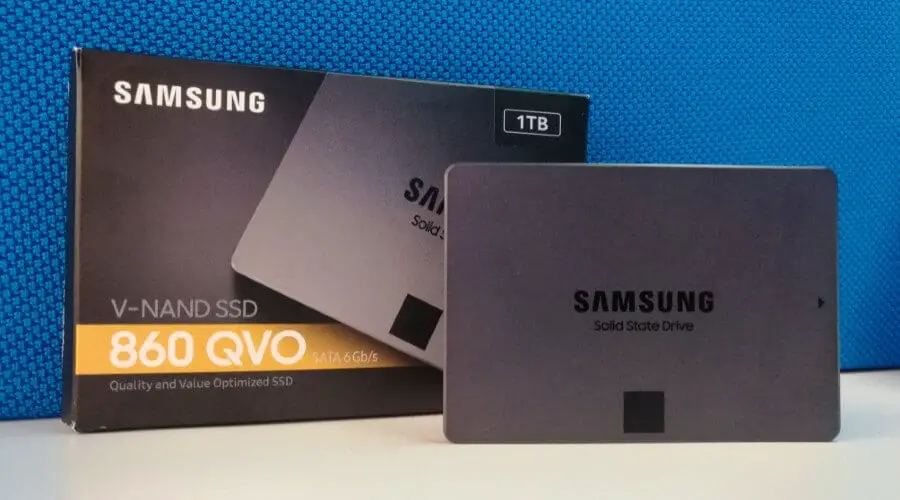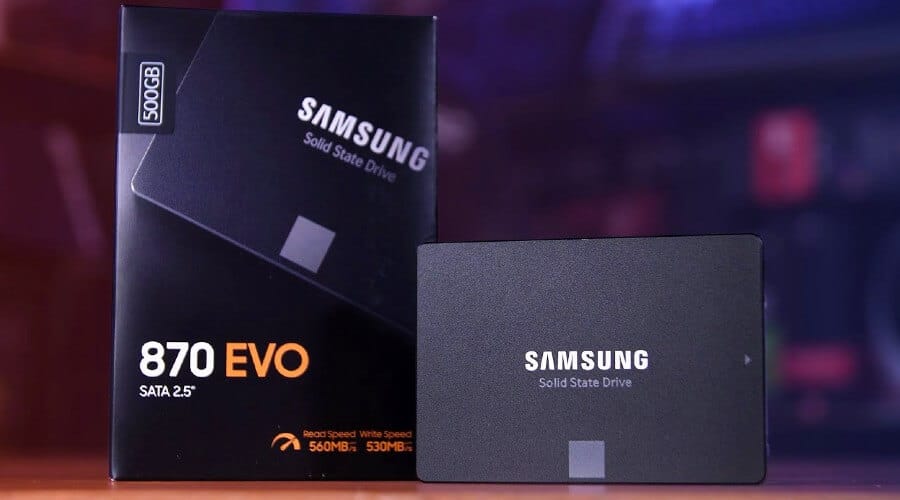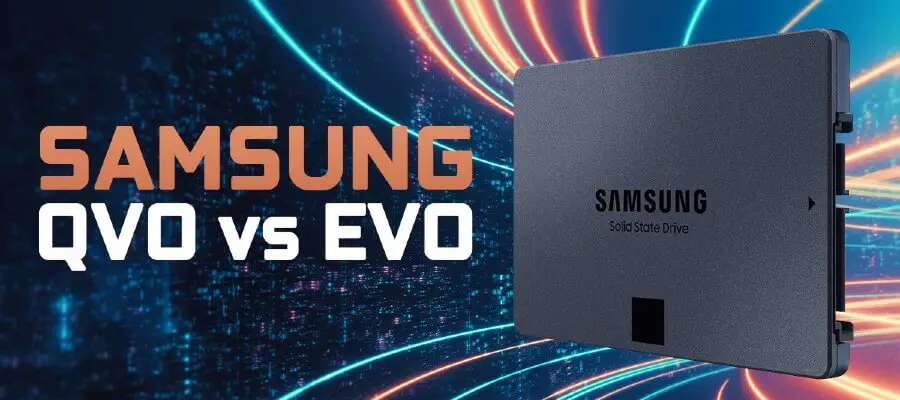From the beginning of the invention of the computer, HDD has been an important part of a computer. As time goes by, advanced technologies become more popular, making the older and slower equipment less useful. SSD is a perfect example of that. As we know, HDD is a typical data storage device that uses magnetic storage to keep and get digital data applying one or more hard, rapidly rotating disks or platters covered with a magnetic substance.
Now, SSD does the same type of work in a quick time and using less power. If we want to describe SSD straightforwardly, we can say that it is also a storage device of a laptop or computer, which is non-volatile, flash-based memory that works faster than a traditional hard disk.
Computer or Laptop users now intend to use an SSD than an HDD because of their benefit. There are many well-known SSD providers like Samsung, Corsair, Adata, and many more in the market. Samsung has a variety of options in their SSD device and provides the best performance. That’s why people choose them over other brands.
But they face problems in choosing the best one between the different variants of Samsung’s SSD. Samsung offers three types of SSD, and they are QVO, EVO, and PRO. PRO variant is considered as the best of all and high rated. Most people go for a mid-range device, and they get confused between QVO and EVO.
The main difference between QVO and EVO is the capacity of NAND flash chips which determines the capability of storing data in the SSD. There are four cell types in an SSD known as SLC(Single-level), MLC(Multi-level), TLC(Triple-level), and QLC(Quad-level). EVO is considered better than QVO because of its four-bit QLC technology, while EVO uses three-bit TLC technology. It makes EVO faster and more long-lasting than QVO SSD’s.
In this article, we will get to know more about these Samsung SSD variants and find out their differences. After reading this article, it will be easier for you to choose between the best one.
About Samsung QVO

For Samsung, the QVO SSD is the first consumer-grade QLC NAND drive. Now, you can ask what consumer-grade is. Normally, SSD comes into the market in two categories that are enterprise-level and consumer-level. In consumer-level SSD, the focus is more on cost, capacity, performance, and data integrity.
The lower price is the good side of a QVO SSD compared to an EVO SSD. But as the price is low, you will get less speed, durability, dependability, and warranty. The QVO SSDs come with the same sequential write and read rate compared to the EVO. About 4KB random write and read speed is lower than EVO.
In Samsung QVO, there is the presence of Intelligent TurboWrite technology like other categories of Samsung SSD. This useful technology increases the writing speed during the data transfer period. But when the buffer raises to its limits, then it stops working, and the writing speed goes down to about 80MB/s.
Samsung offers a various range of capacity to their QVO segments, such as 1 TB, 2 TB, and 4 TB. The QVO SSDs have sixty percent less endurance than the EVO. Sequentially, its Dynamic Ram (DRAM) cache starts at 1GB, 2GB, and 4GB.
About Samsung EVO

If you want to choose one of the top-rated SSD in the market, you have to consider the Samsung EVO. This Samsung EVO provides the best performance than the Samsung QVO series or any other SSD. You can compare it with the Samsung PRO segment.
According to Samsung’s description, EVO series SSDs have the 65-layer V-NAND that reduces energy use up to thirty percent than the previous SSD that came with 48-layer. In these SSDs, the input voltage is also reduced to 2.5, and the previous SSDs need about 3.3 voltage. That’s how the use of power is reduced. In this EVO series, Samsung also makes the SSD one and half times faster than its ancestor by cutting the program execution time to five hundred microseconds.
Another feature that EVO does better than QVO is that its Dynamic Ram (DRAM) cache memory setting per capacity is higher than that of the QVO. It has a writing speed of about 550 MB/s, and at the time of sequential writing, the speed remaining at about 520 MB/s. This EVO series SSDs has a TBW of 150 TB in the 250 GB capacity version, and for the 4TB version, the TBW is 2400 TB.
This EVO series of Samsung SSD is designed especially for conventional PCs and laptops. It provides a vast range of memory spaces and form factors. EVO series SSDs are based on TLC instead of QLC; that’s why they are faster and long-lasting than the QVO series.
As we mention in the QVO section, this EVO series also has the TurboWrite technology, making the writing speed much faster during the time of data transfer.
If you are mindful about the warranty, then you have good news because this EVO series gives you five years of warranty while the QVO series gives only three years.
All of these unique specifications make EVO one of the top-rated SATA SSD series at this time. Samsung earns a lot of reputation by keeping this EVO series in the market for a long time. There is some country where it sells are double than other brands SSD. Samsung keeps producing more beneficial and faster series and keeps the price affordable to compete with the other brands.
Cost
In the beginning, you have the option to store only one single bit of data in a single memory cell. That’s why to store big data; you need to have large storage, which costs a lot of money.
But today, technology advances at a great pace, and different storage devices are invented using the ability to store large amounts of data in a little device. Such as the technology of QLC, MLC, and TLC increases the capability of SSD to store data. That’s why the cost is also reduced than previous times. The EVO series is more expensive than the QVO series because EVO has more data storing capacity.
Performance

In an SSD, the NAND flash does the job of writing and reading using the voltage at the data transfer time. But the cell level has an important impact on the performance of an SSD by increasing the storage capacity. As the EVO is based on the TLC technology, it performs better than a QVO SSD.
Durability
To find out the best one, you have to understand how SSD works. An SSD normally does the work of reading, writing, erasing the old data, and writing the new data. This procedure of SSD is known as the program/erase (P/E) cycle. An SSD performs well until the P/E cycle runs out of an SSD.
A TLC-based SSD supports 3000 P/E cycles, and a QLC based SSD has only 1000 P/E cycles. This info confirms that which is more long-lasting. That’s why the Samsung EVO is far ahead of the QVO series because of its durability.
Conclusion
After comparing all sides of an SSD, we can conclude that the EVO series of Samsung is winning all the comparisons with the QVO series of the same brand. The EVO series has provided better performance, endurance, and warranty, and they are more long-lasting than the QVO series.
Though the EVO series SSDs price is comparatively higher than the QVO series. But there are a lot of reasons for that. If you want better performance and a better device, you have to pay a little more. The EVO charges more because of its better quality device and performance.
If we look at the QVO series SSDs, they are indeed falling behind the EVO series, but they are also good as entry-level SSD. Their performance is fast enough to work properly in a conventional laptop or PC, and it is suitable for general customer use, especially for space duties. You won’t find any difference from other less popular SATA SSD while using the QVO SSD.
If you are a performance-oriented enthusiast, then the QVO series is not for you. The EVO series will be the better one for you against QVO.
-our editorial board has reviewed this article and has been approved for publication according to our editorial policy.

